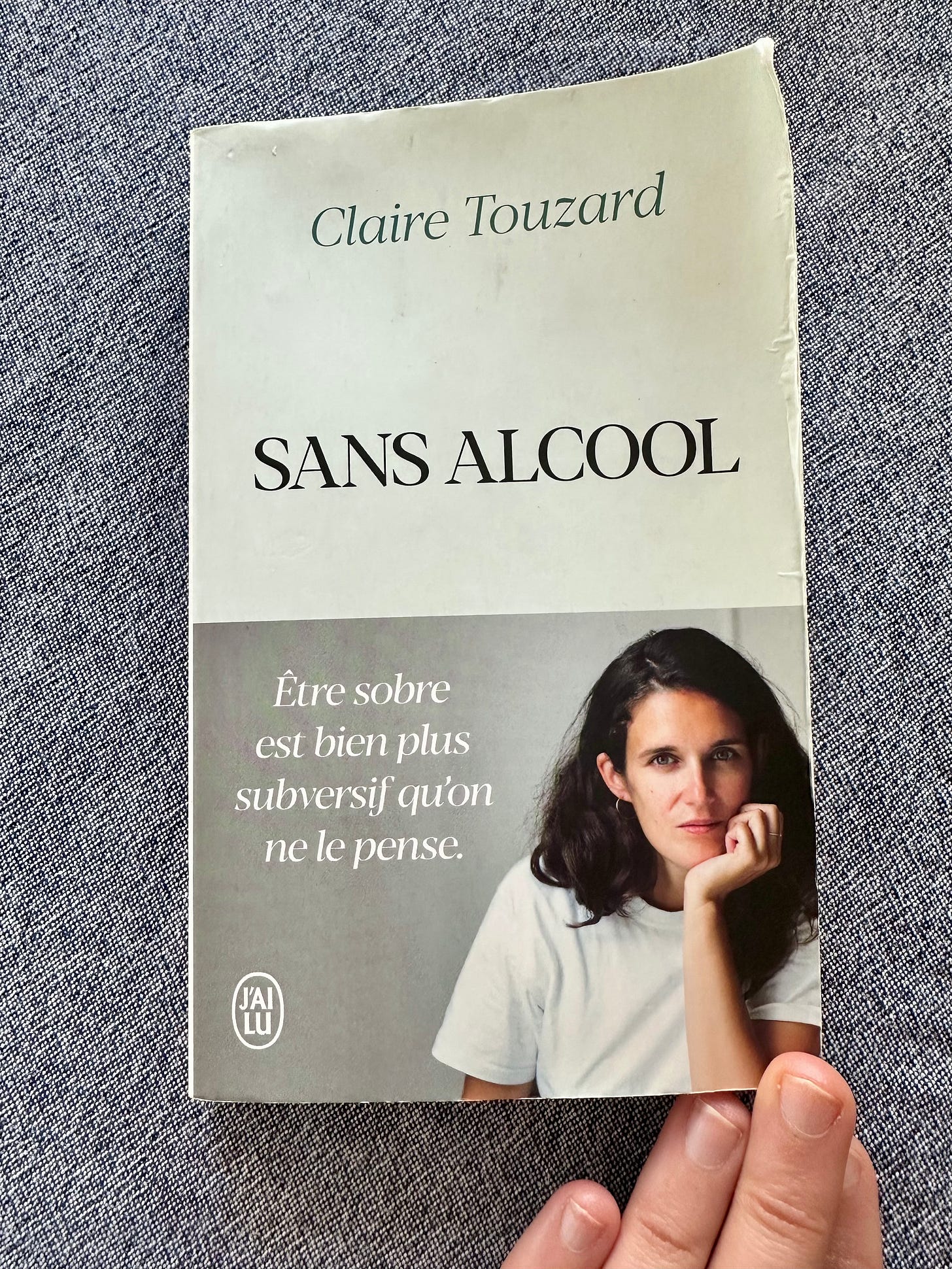When I picked up French journalist Claire Touzard’s Sans Alcool (Without Alcohol) at a bookshop in Belleville, it was out of sheer curiosity. I hadn’t seen many French voices entering the conversation about drinking less, especially compared to the English-speaking world. Every January, my feeds flood with discussions about Dry January, moderation, and sobriety experiments, but this year in Paris, January looked like any other month. Bars were full. Smokers clutched glasses of wine at frozen terrasses. Life rolled on, unbothered.
Touzard’s book felt refreshing because it wasn’t trying to be a guide. It read like a diary: messy, emotional, nonlinear. She drank heavily (daily bottles of wine), and for her, quitting cold turkey was the only way out. Her story made me reflect on my own drinking habits here, and the role alcohol plays in Parisian life.
When I first moved to Paris, I drank more than felt comfortable, though by French standards I was normal; a glass or two of wine a night was nothing. A long dinner with four glasses wasn’t alarming—it was convivial, stylish. But internally, something felt off. I wasn’t sleeping well. My anxiety was high. I felt sluggish, puffy, irritable, but it was hard to pinpoint the cause when my lifestyle looked identical to everyone else’s around me.
The conversation around alcohol often swings between two extremes: full-blown dependency or complete abstinence. But what about the middle drinkers, the ones who can go days without drinking, yet still find themselves unintentionally binging over a long dinner? When does normal become problematic?
The turning point came after one particularly rough night: an empty stomach, too much wine, new friends I barely remembered meeting. I woke up wracked with shame and decided to stop drinking for a while. I lasted 46 days. In that time, my sleep dramatically improved, my digestion settled, and my anxiety lessened. Yet socially, it was isolating. In Paris, where sharing a bottle is often de rigueur, abstaining raises more eyebrows than overindulging.
I eventually returned to drinking, but the experience shifted something. Over the past year, I’ve rebuilt a relationship with alcohol that feels much healthier. Early on, I could easily have two glasses of wine every night. Now, I usually average four to five drinks a week.
I still love wine, its history, its geography, its taste. I have a WSET diploma, and one of my freelance gigs involves leading food & wine tours. Loire Valley chenin blancs and bold Rhône Valley reds continue to make my heart skip. But I’ve moved from thinking of wine as a daily ritual to a several-times-a-week pleasure, often reserved for moments that truly merit it.
This shift hasn’t been easy in Paris. Drinking is often the invisible thread that weaves people together here. It’s how you make friends, relax, celebrate, endure. Non-alcoholic options at bars are usually limited to sodas or overpriced Perriers. Over time, I’ve built some habits that help:
–Media as reinforcement: I listen to podcasts like Andrew Huberman’s breakdown of alcohol’s effects, and occasionally check in with flexible sobriety voices like “Soberish Mom.”
–Planning ahead: I map out my drinking like others might meal-plan, usually aiming for no more than five drinks a week. I’m writing these words from London, where I’m on a mini vacation with a friend; my drinking plan for this short trip has been to cap it at two drinks a night, with the understanding that once I’m back in Paris, I’ll take a fully sober week. For me, moderation can be flexible.
–Tracking: In my old-school paper agenda, I jot down what I drank each day. Awareness alone has changed my patterns.
–Caring less: I’ve accepted that servers don’t really care if I order a ginger beer or sparkling water. Money is money, and a filled table is a filled table.
–Listening to my body: I now notice exactly how even a few drinks can disrupt my sleep, mood, and energy.
There’s still a stubborn stigma around drinking less in Paris. President Macron’s government has been reluctant to officially promote Dry January, wary of alienating the powerful wine lobby. And yet I’ve heard that national consumption is declining. Maybe I’m just missing it from my little corner of Paris, where bars stay busy and wine bottles pile up in recycling bins every Monday morning.
Reading Claire Touzard’s story reminded me that there’s no one-size-fits-all solution. Some people will need full sobriety. Others, like me, might find peace in moderation. What matters is having more honest conversations about it—about what drinking feels like in our bodies, our relationships, our lives.
And maybe making a little more space, in this city of wine, for a quieter kind of pleasure, too.
À bientôt,
—Victorine






Good post! I’m finally trying to practice intentional self care 2 months a year & my self care includes drinking less alcohol.
I was never a regular drinker but I completely stopped in 2016 and don’t miss it one bit. And I never feel badly at a restaurant when not ordering anything beyond water. Lots of people don’t drink (AA, medication, health issues etc) and I’ve enjoyed multiple trips to Paris since then sans alcool, sans problème. Oh and what a money saver! If my friends drink we no longer “split the bill”, I refuse to pay an extra $20 to subsidize their choices. No judgment either way please. I know it’s a huge part of the French culture (and social life in general) but times and people change, all in their own time.